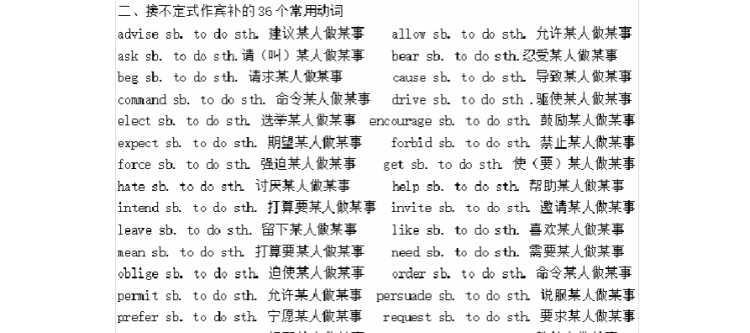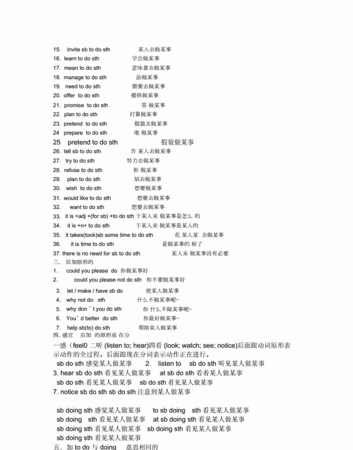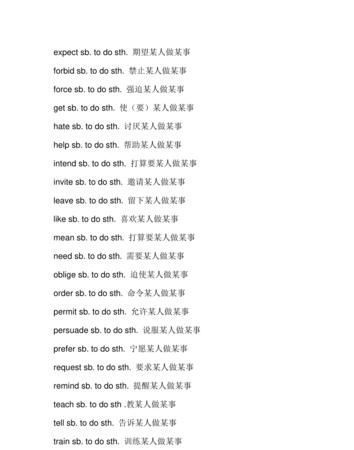本文目录
高考英语常考短语汇总
接动名词(不接不定式)作宾语的34个常用动词
admit doing sth. 承认做某事 advise doing sth. 建议做某事
allow doing sth. 允许做某事 appreciate doing sth. 感激做某事
avoid doing sth. 避免做某事 consider doing sth. 考虑做某事
delay doing sth. 推迟做某事 deny doing sth. 否认做某事
discuss doing sth. 讨论做某事 dislike doing sth. 不喜欢做某事
enjoy doing sth. 喜爱做某事 escape doing sth. 逃脱做某事
excuse doing sth. 原谅做某事 fancy doing sth. 设想做某事
finish doing sth. 完成做某事 forbid doing sth. 禁止做某事
forgive doing sth. 原谅做某事 give up doing sth. 放弃做某事
imagine doing sth. 想象做某事 keep doing sth. 保持做某事
mention doing sth. 提及做某事 mind doing sth. 介意做某事
miss doing sth. 错过做某事 pardon doing sth. 原谅做某事
permit doing sth. 允许做某事 practice doing sth. 练习做某事
prevent doing sth. 阻止做某事 prohibit doing sth. 禁止做某事
put off doing sth. 推迟做某事 report doing sth. 报告做某事
risk doing sth. 冒险做某事 stop doing sth. 停止做某事
suggest doing sth. 建议做某事 understand doing sth. 理解做某事
接现在分词作宾补的20个常用动词
bring sb. doing sth.引起某人做某事 catch sb. doing sth. 碰上(撞上)某人做某事
discover sb. doing sth. 发现某人做某事 feel sb. doing sth. 感觉某人做某事
find sb. doing sth. 碰上(撞上)某人做某事 get sb. doing sth. 使某人做某事
have sb. doing sth. 使某人做某事 hear sb. doing sth. 听见某人做某事
keep sb. doing sth. 使某人不停地做某事 listen to sb. doing sth. 听某人做某事
look at sb. doing sth. 看着某人做某事 notice sb. doing sth. 注意到某人做某事
observe sb. doing sth. 观察某人做某事 prevent sb. doing sth. 阻止某人做某事
see sb. doing sth. 看见某人做某事 send sb. doing sth.使某人(突然)做某事
set sb. doing sth. 使(引起)某人做某事 start sb. doing sth. 使某人开始做某事
stop sb. doing sth. 阻止某人做某事 watch sb. doing sth. 看某人做某事
接不定式或动名词作宾语意思相同的12个动词
like to do sth / like doing sth. 喜欢做某事
love to do sth / love doing sth. 喜欢做某事
hate to do sth / hate doing sth. 憎恨做某事
prefer to do sth / prefer doing sth. 宁可做某事
begin to do sth / begin doing sth. 开始做某事
start to do sth / start doing sth. 开始做某事
continue to do sth / continue doing sth. 继续做某事
can’t bear to do sth / can’t bear doing sth. 不能忍受做某事
bother to do sth / bother doing sth. 麻烦做某事
intend to do sth / intend doing sth.想要做某事
attempt to do sth / attempt doing sth. 试图做某事
cease to do sth / cease doing sth. 停止做某事

小学所有英语单词和短语
hate doing,,
love doing
接动名词(不接不定式)作宾语的34个常用动词
admit doing sth. 承认做某事
advise doing sth. 建议做某事
allow doing sth. 允许做某事
appreciate doing sth. 感激做某事
avoid doing sth. 避免做某事
consider doing sth. 考虑做某事
delay doing sth. 推迟做某事
deny doing sth. 否认做某事
discuss doing sth. 讨论做某事
dislike doing sth. 不喜欢做某事
enjoy doing sth. 喜爱做某事
escape doing sth. 逃脱做某事
excuse doing sth. 原谅做某事
fancy doing sth. 设想做某事
finish doing sth. 完成做某事
forbid doing sth. 禁止做某事
forgive doing sth. 原谅做某事
give up doing sth. 放弃做某事
imagine doing sth. 想象做某事
keep doing sth. 保持做某事
mention doing sth. 提及做某事
mind doing sth. 介意做某事
miss doing sth. 错过做某事
pardon doing sth. 原谅做某事
permit doing sth. 允许做某事
practice doing sth. 练习做某事
prevent doing sth. 阻止做某事
prohibit doing sth. 禁止做某事
put off doing sth. 推迟做某事
report doing sth. 报告做某事
risk doing sth. 冒险做某事
stop doing sth. 停止做某事
suggest doing sth. 建议做某事
understand doing sth. 理解做某事
四、接现在分词作宾补的20个常用动词
bring sb. doing sth.引起某人做某事
catch sb. doing sth. 碰上(撞上)某人做某事
discover sb. doing sth. 发现某人做某事
feel sb. doing sth. 感觉某人做某事
find sb. doing sth. 碰上(撞上)某人做某事
get sb. doing sth. 使某人做某事
have sb. doing sth. 使某人做某事
hear sb. doing sth. 听见某人做某事
keep sb. doing sth. 使某人不停地做某事
listen to sb. doing sth. 听某人做某事
look at sb. doing sth. 看着某人做某事
notice sb. doing sth. 注意到某人做某事
observe sb. doing sth. 观察某人做某事
prevent sb. doing sth. 阻止某人做某事
see sb. doing sth. 看见某人做某事
send sb. doing sth.使某人(突然)做某事
set sb. doing sth. 使(引起)某人做某事
start sb. doing sth. 使某人开始做某事
stop sb. doing sth. 阻止某人做某事
watch sb. doing sth. 观察某人做某事
enjoy doing sth喜欢做某事、
feel like doing sth想要做某事
practise doing sth练习做某事
imagine doing sth想象做某事
like doing sth喜欢做某事
prefer doing sth更喜欢做某事
finish doing sth做完了某事

动词后面加todo和doing
一、 习惯上只接动名词作宾语的动词
admit(承认),advise(建议),allow(允许),anticipate(预料),appreciate(感激),avoid(避免),consider(考虑),defer(延期),delay(推迟),deny(否认),detest(讨厌),discuss(讨论),dislike(不喜欢),dread(担心),enjoy(喜爱),escape(逃脱),excuse(原谅),fancy(设想),finish(完成),forbid(禁止),forgive(原谅),imagine (想像),keep(保持),loathe(厌恶),mention(提及),mind(介意),miss(没赶上),pardon(原谅),permit(允许),practice(练习),prevent(阻止),prohibit(禁止),propose(建议),recollect(记得),report(报告),resent(愤恨),resist(抵制),risk(冒险),stand(容忍),stop(停止,阻止),suggest(提议),understand(理解)
二、接动名词或不定式作宾语且意义相差不大的动词
like(喜欢),love(喜欢),hate(憎恨),prefer(宁可),begin(开始),start(开始),continue(继续),can’t bear(不能忍受),bother(麻烦),intend(想要),cease(停止)
三、 接动名词或者不定式作宾语但意义不同的动词
接动名词或者不定式作宾语但意义不同的动词
1、remember(记得),forget(忘记),regret(后悔),stop(停止)
(1)后接不定式时指该不定式所表示的动作后发生.例如:
Remember to clean your room. 记得打扫房间.(还未打扫,先是remember,之后才clean)
He forgot to pay me the money. 他忘记要给我付钱了.(尚未付钱,forgot时还没pay)
He stopped to listen, but heard nothing. 他停下来听了听,但什么声音也没有听到.(先停后听)
(2)后接动名词时则指该动名词所表示的动作先发生.例如:
I remember cleaning the classroom. 我记得打扫了教室.(已打扫过)
He forgot paying me the money. 他忘记曾给我付过钱.(已付过钱了)
He stopped speaking. 他不讲话了.(先说后停)
(3)注意:go on to do sth 和go on doing sth 也有类似差别:前者表示做完某事后接着做另一事,后者表示继续做正在做的事.例如:
You shouldn’t go on living this way. 你不应该再这样生活下去了.(go on 后接doing通常被认为是现在分词而不是动名词)
Go on to do the other exercises after you have finished this one. 做完这个练习后, 请接着做其他的练习
2、try 后接不定式表示设法做某事,接动名词表示做某事试试(看有什么效果).例如:
I’ll try to come tomorrow. 我明天设法来.
Let’s try knocking at the back door. 咱们敲敲后门试试.
3、mean 后接不定式表示打算(想要)做某事,接动名词表示意味着(做某事,接动名词表示意味着要)做某事.例如:
He did not mean to hurt you. 他不是有意要伤害你.
This illness will mean going to hospital. 得了这种病就意味着要住院.
4、can’t help后接动名词表示禁不住做某事,接不定式表示不能帮助做某事.例如:
He couldn’t help crying when he heard the news. 他听到这个消息时禁不住哭了.
The medicine can’t help to get rid of your cold. 这药不能帮你治好感冒.
四、接“逻辑主语+动名词”结构的动词
接“逻辑主语+动名词”结构的动词
有些动词后接动名词作宾语时通常带有逻辑主语,构成“动词+名词/代词+动名词”或者“动词+物主形容词/名词所有格+动名词”的结构.此类动词通常有:dislike(或like的否定句),dread, fancy, mean, mind, involve, propose, recollect, remember, resent, save, stop, suggest, understand等.例如:
My father dislikes me/my working late. 我父亲不喜欢我工作到很晚.
He resented me/my being promoted before him. 他不满我先于他提升.
I don’t remember our teacher(’s) complaining. 我不记得老师曾抱怨过.
Do you mind his/him sitting here? 你介意他坐这儿吗?
excuse, forgive, pardon和prevent后除了可以用上述结构外,还可以接“代词+介词+动名词”的结构.例如:
Forgive my/me calling you up so early. 请原谅我这么早给你打电话.
Forgive me for calling you up so early. 请原谅我这么早给你打电话.
You can’t prevent his/him spending his own money. 你不能阻止他花他自己的钱.
You can’t prevent him from spending his own money. 你不能阻止他花他自己的钱.
五、 接不定式或者现在分词作宾补的动词
此类动词通常是see, hear, feel, smell, listen to, notice, watch等感官动词.我们一般用现在分词来表示正在进行的未完成的动作;用不定式表示已经完成的动作,经常性的动作,或非延续性的动作,此时的动词不定式在主动语态中不带to,在被动语态中必须带to.例如:
I saw him playing basketball on the playground. 我看见他在操场上打篮球.(正在打,部分过程)
I saw him play basketball on the playground. 我看见他在操场上打篮球.(打完球了,全过程;主动句,无to)
He was seen to play basketball on the playground. 有人看见他在操场上打篮球.(被动句,要带to)
I noticed him buy a pen in the shop. 我看见他在商店里买了一支笔.(buy为非延续性动词)
We often hear her sing in the classroom. 我们经常听见她在教室里唱歌.(经常性的动作)

英语单词后加todo和doing的词
to do:
1、afford to do sth.负担得起做某事
2、agree to do sth.同意做某事
3、arrange to do sth.安排做某事
4、ask to do sth.要求做某事
5、beg to do sth.请求做某事
6、care to do sth. 想要做某事
7、choose to do sth. 决定做某事
8、decide to do sth. 决定做某事
9、demand to do sth. 要求做某事
10、determine to do sth. 决心做某事
11、expect to do sth. 期待做某事
12、fear to do sth. 害怕做某事
13、help to do sth. 帮助做某事
14、hope to do sth. 希望做某事
15、learn to do sth. 学习做某事
16、manage to do sth. 设法做某事
17、offer to do sth.主动提出做某事
18、plan to do sth. 计划做某事
19、prepare to do sth. 准备做某事
20、pretend to do sth. 假装做某事
21、promise to do sth. 答应做某事
22、refuse to do sth. 拒绝做某事
23、want to do sth. 想要做某事
24、wish to do sth. 希望做某事

doing:
1、enjoy doing sth. 喜爱做某事
2、escape doing sth. 逃脱做某事
3、excuse doing sth. 原谅做某事
4、fancy doing sth. 设想做某事
5、finish doing sth. 完成做某事
6、forbid doing sth. 禁止做某事
7、forgive doing sth. 原谅做某事
8、give up doing sth. 放弃做某事
9、imagine doing sth. 想象做某事
10、keep doing sth. 保持做某事
11、mention doing sth. 提及做某事
12、mind doing sth. 介意做某事
13、miss doing sth. 错过做某事
14、pardon doing sth. 原谅做某事
15、permit doing sth. 允许做某事
16、practice doing sth. 练习做某事
17、prevent doing sth. 阻止做某事
18、prohibit doing sth. 禁止做某事
19、put off doing sth. 推迟做某事
20、report doing sth. 报告做某事
21、risk doing sth. 冒险做某事
22、stop doing sth. 停止做某事
23、suggest doing sth. 建议做某事
24、understand doing sth. 理解做某事
以上就是关于加doing的短语 ,高考英语常考短语汇总的全部内容,以及加doing的短语 的相关内容,希望能够帮到您。

